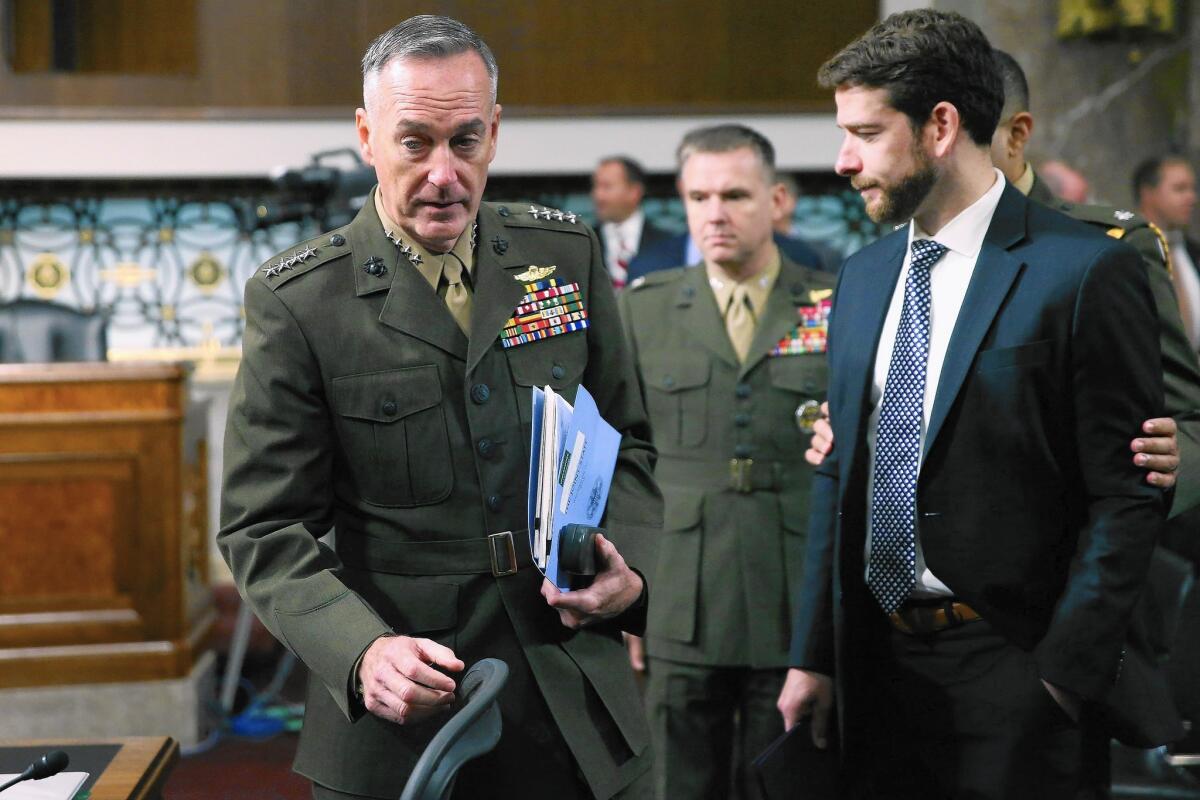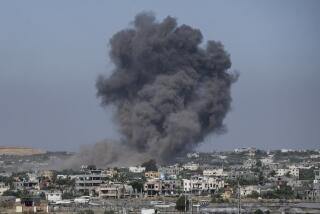Russia and Iran helping Assad gain upper hand in Syria, head of Joint Chiefs says

reporting from Washington — Russian bombing and Iranian-backed forces have helped give Syrian President Bashar Assad’s embattled forces an advantage in the country’s bitter civil war, the top U.S. military officer said Tuesday, suggesting a sharp setback for the Obama administration.
Gen. Joseph F. Dunford Jr., chairman of the Joint Chiefs of Staff, appeared to contradict upbeat assessments by the White House last month that indicated Assad’s government had suffered a series of military losses and was losing control.
Although the long-term effect is far from clear, Pentagon intelligence has concluded for now that Russian air attacks, which began Sept. 30, and growing involvement by Iranian-backed forces have helped Assad’s military advance on several critical fronts and extend his grip on power.
“The balance of forces right now are in Assad’s advantage,” Dunford, who visited the region last week, told the Senate Armed Services Committee.
Citing the Obama administration’s continued failure to find a reliable military partner in Syria, Dunford said, “No one is satisfied with our progress to date.”
The apparent battlefield shift is likely to prolong a bloody conflict that has left more than 200,000 dead, sparked a horrific refugee exodus and boosted Russia’s military and political role in the Middle East for the first time in decades.
Iran’s involvement, meanwhile, has grown to such an extent that its diplomats were invited to participate in high-profile international talks over Syria’s future that will take place Friday in Vienna, according to the State Department. Secretary of State John F. Kerry will represent the United States.
The talks give Iran, which strongly supports Assad, a new standing in diplomatic efforts to resolve the conflict. But Tehran’s presence may upset regional powers, including Saudi Arabia, which worry about Iran’s growing influence.
President Obama spoke by phone Tuesday with Saudi King Salman, according to the White House. The two leaders committed “to increasing support for the moderate Syrian opposition” and “cooperating closely” in the Vienna talks.
NEWSLETTER: Get the day’s top headlines from Times Editor Davan Maharaj >>
Tehran has acknowledged sending additional advisors to Syria, but denies U.S. charges that Iranian ground troops have been deployed. Several high-ranking Iranian commanders have been killed in Syria, however.
Iran also aids a number of Shiite Muslim militias fighting on the side of Assad’s army, including volunteers from Afghanistan and Pakistan and fighters from Hezbollah, the Lebanese political and paramilitary group closely tied to Iran.
Assad’s government has reported steady gains in recent weeks, especially in northern and central Syria, in the heavily contested provinces of Homs, Hama and Aleppo, as well as in coastal Latakia. Analysts say that has provided a morale boost to Syrian forces as well as Assad’s civilian supporters.
Rebel groups say they have fought back, hitting government tank thrusts with antitank missiles provided in a covert CIA program. The opposition has posted Internet images of Syrian tanks purportedly hit by rebel antitank missiles.
But Assad’s apparent gains are a blow to the White House, which has urged the Syrian leader to step down since the war began in 2011. It considers his departure necessary for a political resolution of a multi-sided civil war that pits his government against hundreds of armed groups, including Islamic State.
U.S. and coalition warplanes have focused almost exclusively on attacking Islamic State positions, not Assad’s forces, in an effort to kill the group’s leaders and fighters, break their communication lines and deny them sources of revenue, including oil production.
In recent weeks, Russian airstrikes have supported Assad’s forces and Iranian-backed fighters in an offensive against rebel groups in Aleppo province. The government recaptured areas south of Aleppo in an effort to cut off rebel supply lines.
After nearly five years of war, however, Syrian forces are battle weary and Russia has struggled to coordinate its airstrikes with pro-Assad ground forces, who speak a mix of Arabic, Persian and limited Russian, according to a U.S. official who spoke on condition of anonymity in discussing internal assessments.
Defense Secretary Ashton Carter said Russia appears to be “doubling down” on its support for Assad.
“They need advisors, artillery and aviation to enable and support the Assad regime and Iranian forces [to attack] moderates who oppose the regime and are essential to Syria’s political transition,” he told the Senate committee.
Russia drew headlines this month by firing its first ship-to-shore cruise missiles in combat and has repeatedly claimed high accuracy with its bombing. But Carter dismissed those claims, saying “as high as 85% to 90%” of the airstrikes use dumb bombs that “obviously increase the possibility of civilian casualties.”
In coming weeks, the Pentagon plans to focus more on dislodging Islamic State from Raqqah, the militant group’s self-declared capital in Syria, Carter said.
He said the Pentagon and its allies will provide more arms and other support to moderate Syrian militias, some of which have advanced to about 30 miles from the city, and will intensify airstrikes against Islamic State leaders and oil production facilities.
The Pentagon also plans to step up support for Kurdish militias and Turkish security forces at Syria’s northern border. It also will supply arms to vetted insurgent groups who already are arrayed in the field, officials said.
The shift marks a contrast to earlier this year.
SIGN UP for the free Essential Politics newsletter >>
In spring, the Syrian military was retrenching, clearly on the defensive. An Al Qaeda-led rebel coalition had mostly evicted Syrian troops from the strategic northwestern province of Idlib.
In May, Islamic State forces overran Palmyra, in the desert east of Homs city. Syrian forces were unable to dislodge Islamist rebels from the suburbs of Damascus, the capital, despite years of battles.
Appearing on national television, Assad acknowledged that the government was forced to retreat to maintain core areas, including Damascus, the highway north to the city of Homs, and routes west to the Mediterranean coast, a pro-government stronghold.
The Russian-backed offensive has helped relieve the pressure on those areas.
“It’s remarkable what can happen when your forces get outside support with airstrikes and artillery,” said another U.S. official who was not authorized to speak publicly on the matter. “The regime has slowly made gains and a lot of it is because of the help they’ve received.”
Hennigan and Bennett reported from Washington and McDonnell from Beirut. Times staff writer Paul Richter in Washington contributed to this report.
ALSO
Austria to build fence along parts of border with Slovenia to ‘bring order’ to migrant flow
China’s Studio City, a Hollywood-themed casino-resort, opens in Macau
Why all the fuss in the South China Sea?
More to Read
Sign up for Essential California
The most important California stories and recommendations in your inbox every morning.
You may occasionally receive promotional content from the Los Angeles Times.












